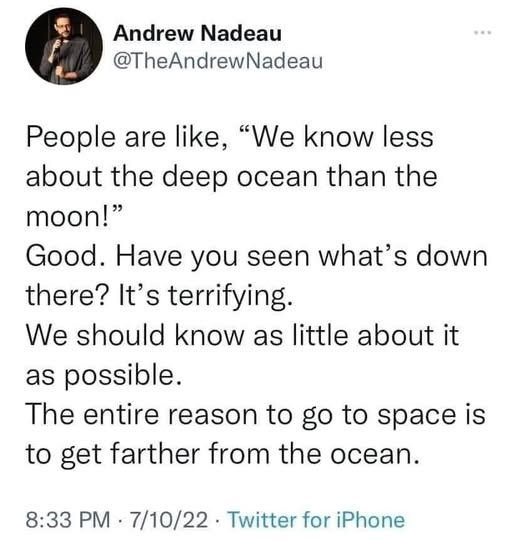this post was submitted on 08 Apr 2025
1490 points (98.3% liked)
Science Memes
14495 readers
1485 users here now
Welcome to c/science_memes @ Mander.xyz!
A place for majestic STEMLORD peacocking, as well as memes about the realities of working in a lab.

Rules
- Don't throw mud. Behave like an intellectual and remember the human.
- Keep it rooted (on topic).
- No spam.
- Infographics welcome, get schooled.
This is a science community. We use the Dawkins definition of meme.
Research Committee
Other Mander Communities
Science and Research
Biology and Life Sciences
- [email protected]
- [email protected]
- [email protected]
- [email protected]
- [email protected]
- [email protected]
- [email protected]
- [email protected]
- [email protected]
- [email protected]
- [email protected]
- [email protected]
- [email protected]
- [email protected]
- [email protected]
- [email protected]
- [email protected]
- [email protected]
- [email protected]
- [email protected]
- [email protected]
- [email protected]
- [email protected]
- [email protected]
- !reptiles and [email protected]
Physical Sciences
- [email protected]
- [email protected]
- [email protected]
- [email protected]
- [email protected]
- [email protected]
- [email protected]
- [email protected]
- [email protected]
Humanities and Social Sciences
Practical and Applied Sciences
- !exercise-and [email protected]
- [email protected]
- !self [email protected]
- [email protected]
- [email protected]
- [email protected]
Memes
Miscellaneous
founded 2 years ago
MODERATORS
you are viewing a single comment's thread
view the rest of the comments
view the rest of the comments

While this is funny and all, this isn't really true for a couple of reasons:
So this is one of those things that might feel true, but in reality it really isn't.
Well, now that we know what's out there, I think we should focus our efforts on putting a big sea monster into the ocean.
Too easy. We need to put a sea monster on the moon.
It's a ball full of sharp and toxic shards that get everywhere.
On the other hand, the ocean has immortal jellyfish and snail with iron armor.
It might be more accurate to say the average person knows more about what we don't know about the ocean than what we don't know about the moon.
We have a decent idea about what can and may exist in and about Earth's oceans, but less about the moon; and most people assume it's just a dusty rock too.
Everything outside of my immediate experience is densely packed squid atlanteans. (I feel like some people seem to genuinely think like this, which is distressing)
The blue planet 1 BBC documentary states that we know about the moons surface than ocean floor. The BBC's Blue Planet 2 changed that to: we know more about the surface of mars than we know about the ocean floor.
So make of that what you want.